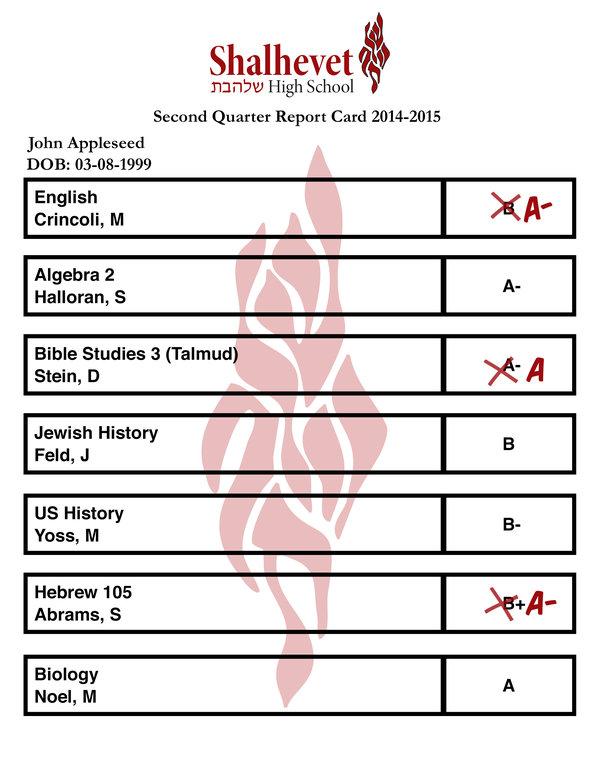Grubbing for the grade: An awkward dance for students and teachers
Students frequently do it, but few want to talk about it – at least on the record. For a variety of reasons, students ask teachers, sometimes insistently, to adjust their grades and scores.
Sometimes it’s just bringing a calculation error to a teacher’s attention. Other times, it’s taking issue with a teacher’s subjective scoring system.
And occasionally, it’s asking for a grade bump for no reason at all. To students who don’t do it – and teachers who may resent it – the practice is referred to as “grade-grubbing,” suggesting that students are scrabbling for grades in the dirt.
If a student is grade-grubbing, that means, from a teacher’s perspective, they are using the class to get a certain grade to achieve something else in life.
— Principal Reb Noam Weissman
“Of course I’ve grade-grubbed,” said junior Derek Orenshein. “I didn’t have a high enough grade in the class and I felt as though I had been cheated out of some points and that I deserved [it].”
Sometimes teachers will agree to change a grade – otherwise, no one would ask. But often, they’re just annoyed.
“As a teacher, it feels really demoralizing and upsetting when that conversation happens,” said Ms. Melanie Berkey, English Academic Chair. “It makes you feel that your class, that is a learning process, is kind of reduced to currency. I don’t think it serves the higher purposes of learning.”
Still, a majority of students believe they have a right to ask a teacher to explain the basis for a grade. Many also think that they are entitled to a grade boost, whether the increase sought is deserved or unearned.
Most students interviewed for this article acknowledged grade grubbing, but did not want to share their personal experiences.
“It’s definitely prevalent,” said junior Daniel Soroudi. “That’s what people who care about their grades do.”
For students who ask, every part of the grading process can be fodder for discussion and debate.
“If you studied really hard, then you have the right to tell the teacher you deserve a higher grade,” said sophomore Noah Suissa.
Even areas typically within the teachers’ subjective judgment are sometimes contested.
“I’ve done it myself a few times,” said junior Henry Wineburgh, one of a few students who shared a personal story.
Last year, Henry complained about his grade on a year-end Tanach essay. According to Henry, his teacher said that the paper he submitted was very good, even “publishable,” but that it did not fully incorporate what he had learned in class.
From Henry’s perspective, the teacher took off points unfairly, because the essay was graded in a subjective manner.
“I really don’t like subjective grades, and it makes me more likely to grade-grub,” said Henry.
Henry’s teacher did not change his grade.
Henry did not take his complaint to the Fairness Committee because he didn’t think it was worth the effort. But last fall, an issue relating to grades was one of three cases brought to the Fairness Committee.
“The case involved a student seeking to change a grade based on mitigating circumstances from last year,” said General Studies Principal Roy Danovich. “In that case, the Fairness committee ruled in favor of the administrators and the teachers involved.”
Students realize that teachers have the final say – but that actually can encourage them to grade-grub.
“You’re not forcing the teacher to do anything,” said Daniel Soroudi. “If the teacher really doesn’t feel like you deserve anything, then he won’t give you anything. He is your teacher, he decides – or she.”
For their part, teachers and administrators acknowledge that student empowerment is an integral part of the Just Community and the learning process, but they differentiate between grade-grubbing and respectful advocacy.
“Advocating is respectfully talking to the teacher, e-mailing the teacher, looking at the work the student has done, and asking from the student’s perspective, ‘Let’s look at this, what can I do differently,’” said Principal Reb Noam Weissman.
“Grade-grubbing is either demanding explicitly or questioning to the extent that they don’t trust what the teacher is doing,” he continued. “When that happens then we are no longer playing for the same team, and that’s when it becomes a problem.”
Students believe that they should be able to ask teachers about their grades without being labelled grade-grubbers.
“I definitely think it’s bothersome,” said freshman Rosie Wolkind. “But sometimes teachers grade things wrong and you need to bring attention to it, and other times you really feel that you deserve a point that the teacher didn’t give you.”
Students agree that teachers should be open to at least discussing their grading.
“I hear it from the teacher’s perspective that sometimes it can be frustrating that a lot of students are going up to them,” said senior Adina Weinreb. “But it’s part of their job and they need to be able to have an open environment where a student can come up to them and ask them why they may have gotten certain points off.”
All teachers interviewed said they would correct actual mistakes in grading, but when a student does not meet expectations, argues trivial points or demands unearned points, they balk.
“If I’ve made a mistake I give everyone the point, but if I haven’t and they are trying to pursue something just for the sake of it, I ignore them — conversation’s over,” said History teacher Dr. Michael Yoss.
Judaic Studies teachers, too, are opposed to raising a student’s grade without a good reason.
“My problem with grade grubbing is that I feel students aren’t honest with themselves,” said Rabbi Ari Schwarzberg. “Students are basically trying to pester teachers in order to manipulate or pressure them into giving them a grade they frankly don’t deserve.
“It becomes an integrity issue,” he continued. “If I decide to elect to give in to one student who grade grubs, then a student who doesn’t grade grub theoretically gets hurt. And that is not fair and I find that to be totally unjust.”
Teachers say grade-grubbing has been increasing — because of the mounting pressure students feel to get into good colleges, they believe.
“It’s more a reflection of the current state of how insane college admissions have become, and this kind of like rat-race mentality that high school has turned into,” said Ms. Berkey. “When it happens it’s more a result of very real pressure students are feeling that the grades mean everything.”
This view is shared by students.
“Such a small jump on your grade can make such a big difference on your GPA,” said Daniel.
For that reason, students especially think they should receive the benefit of the higher grade when their average is just below an A or B.
“When teachers have you at 89.4 or 79.4 or something teetering and tattering on the edge, I think that they should just give in to them if it’s not an enormous deal for them,” says Henry.
Math teacher Ms. Tamara Gidanian has come up with a way to solve that problem.
“If the grade is very, very close to one level grade higher, in that case I ask them either to take another test or do a project or retake some of their tests or quizzes,” said Ms. Gidanian said. “They show that they deserve a little bit extra point to be able to change their grade.”
Teachers who do boost grades say it can ultimately work to the student’s disadvantage.
“I try to do it not when it actually affects the final grade, because it’s really not fair, but definitely I’ll give in to grade-grubbing,” said Judaic studies and math teacher Ms. Atara Segal. “The truth is you don’t really come out ahead because often if someone works really hard and doesn’t grade grub then I’ll boost their grade, and if somebody grade-grubs I never boost their grade.”
It becomes an integrity issue. If I…give in to one student who grade grubs, then a student who doesn’t grade grub theoretically gets hurt.
— Rabbi Ari Schwarzberg, Judaic Studies
Other teachers also don’t mind changing grades if it does not have much of an effect.
“I’ve had kids make an argument for why their grade should be a certain way, and based on evidence I’ve made changes before,” said history teacher William Reusch. “[If] it would be minimal change, I would be fine with that concept.”
But when teachers and students can’t resolve grading issues, tensions can arise between Shalhevet’s normally close students and faculty. Students risk being viewed unfavorably by teachers.
“They become suspect then for future cases when they might deserve something,” said Dr. Yoss. “I’ll be less likely to want to consider it in the first place.”
It’s common enough that teachers discuss it amongst themselves.
“Teachers talk and know those kids that go around to everybody,” said Ms. Berkey.
Students talk about it too, and they are aware of the consequences of asking for a grade change.
“My teacher was nice enough to correct it, but she now thinks of me as a grade-grubber,” said freshman Benny Zaghi, who argued over three points on an exam.
Another consequence may be teasing.
“[Teacher] would always make fun of me and joke that I have to pay better attention because I complained about what I got on the test,” said sophomore Zev Kent. “They start to think that you are not as good of a student.”
“Before I could get words out of my mouth, [he] told me to leave and called me a name,” said Adina when she asked a teacher about a grade.
Both teachers and students say there are things both students and teachers can do to avoid this. The manner in which a student addresses his or her concerns is important. Teachers are more likely to respond positively to students who are respectful.
“The way you phrase things matters a lot,” said Ms. Berkey.
Students agreed.
“There is a difference between complaining and asking,” said Zev. “It’s better to go up nicely and ask the teacher if there is a way to improve.”
Other students have found respectful advocacy to be productive.
“[Teacher] doesn’t like when students [ask for points back], but I did it in a very nice and respectful way, and she actually did give me points back,” said Adina.
From the students’ perspective, there’s something teachers can do, too. When teachers identify their specific grading rubrics with students prior to a test or project, students are less likely to complain about the grades they receive.
My teacher was nice enough to correct it, but she now thinks of me as a grade-grubber.
— Benny Zaghi 9th grade
“In the beginning of the year [Rabbi Schwarzberg] tells you, ‘If you work really hard in my class it doesn’t matter if you get B’s on the assessments – you’re going to have an A in my class,’” said junior Laly Chriki.
Teachers agree that if they are clear about their grading, students are less likely to challenge their grades.
“When we discuss the tests, quizzes and homework, if [the students] know what to expect, they don’t question the grades,” said Ms. Katrina Malikov, Math Department Chair.
With the current pressure to excel in school, grade grubbing is likely to remain a tool for students and a frustration for teachers for the foreseeable future.
Apart from pressure to have a great GPA for college, there are personal reasons, too – which are not likely to disappear.
“There are some students who may feel a lot of pressure to do well and they grub for the perfect grade,” said sophomore Alex Reich. “Or there are other students who feel they should have everything handed to them, and they really think they deserve a better grade.”
Shalhevet’s administration understands that but considers it the opposite of learning for its own sake – the highest form of learning, from a religious perspective.
“If a student is grade-grubbing that means, from a teacher’s perspective, they are using the class to get a certain grade to achieve something else in life,” said Reb Noam. “They are essentially using the class as a stepping stool.”
“Of course grades are important, but if we are working towards an ideal, then grade grubbing wouldn’t exist because the higher purpose of being in school is to learn.”

Since freshman year, Alec Fields has written numerous stories for the Community, Torah, Features, Outside News, Sports and Arts and Culture sections. In 10th grade, Alec received the post of Torah editor and held that position until being named co-Editor-in-Chief for the 2016-2017 school year. He has received awards for, "SUMMER OF WAR: Hollywood, too, was divided," “Refusing Playoff Suspension, Buckley Resigns,” “OUT OF THE SHADOWS: Ancient tradition meets modern sensibility,” and for “Rabbi who sauna-ed with students in New York was scholar-in-residence at Beth Jacob on Shavuot.” Alec is co-captain of Model Congress, co-president of the Finance Club, a founder of Supplies on Demand, a member of the Mock Trial team, Firehawks for Israel, tennis team and grappling club. Some of his favorite classes are Political Theory of Modern Middle East, Psychology, and Government and Economics. When Alec has time he enjoys playing or watching sports, reading...








